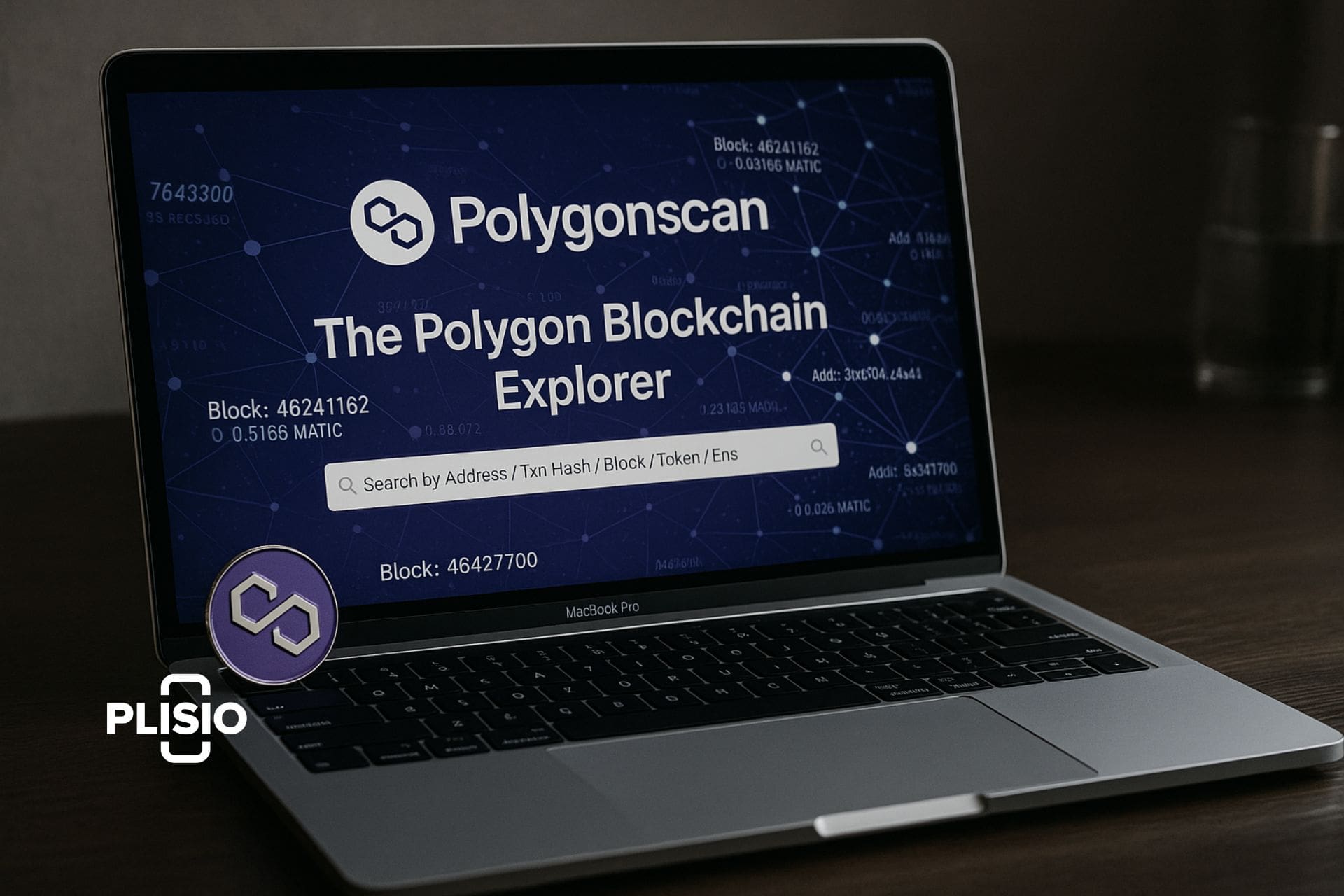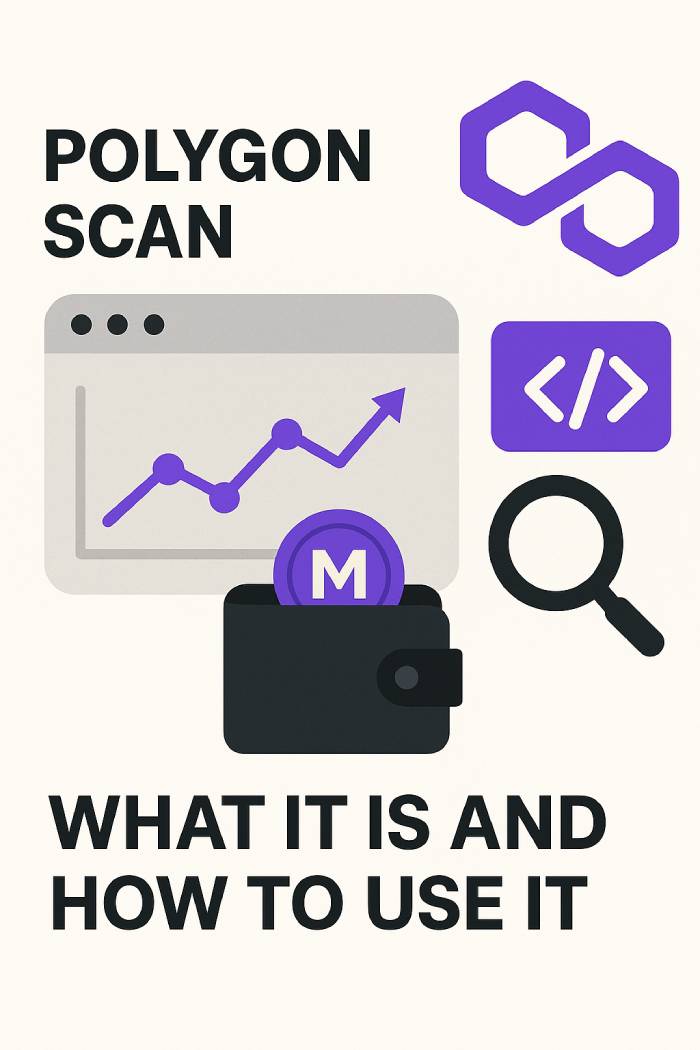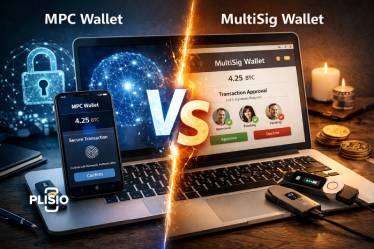Polygonscan: What It Is and How to Utilize It

Polygonscan is a blockchain exploration and analytics tool designed exclusively for the Polygon network. This platform enables users to engage with on-chain information, trace transactions, observe wallet activities, and validate smart contracts, positioning it as an essential resource within the Polygon ecosystem.
Polygonscan serves as a versatile search engine for blockchain activities, showcasing information about every block, token, smart contract, and wallet address. Users can access transaction information, examine wallet activities, and investigate the circulation of NFTs and MATIC tokens. The platform offers powerful tools for developers and users alike to authenticate and monitor data across the network.
What Makes Polygonscan Important?
Polygonscan offers clarity and understanding of the Polygon network, which is experiencing ongoing growth in decentralized applications (Dapps). As of 2025, the Polygon blockchain has surpassed 5.2 billion total transactions, with over 504 million unique wallet addresses recorded. The daily activity peaked at 1.67 million active addresses in mid-2024. These figures highlight the critical need for a reliable block explorer.
Polygonscan fills this role by simplifying access to on-chain statistics and improving verification for smart contracts and token transfers. The platform supports tools like a gas tracker, transaction tracking, and developer APIs. The dashboard displays the amount of MATIC used, recent blocks, and pending transactions — providing a detailed overview of the latest activity, including transaction fees which average under $0.01.
Expert Insight: According to blockchain analyst Elena Choi, “Polygonscan has become an indispensable part of the Polygon network. For both developers and investors, it provides openness, responsibility, and a significant level of confidence. Its user-friendly design facilitates easier access for individuals who are unfamiliar with Web3.
Real-World Example:
A freelance NFT artist, Maya S., uses Polygonscan regularly to track the minting and sale of her digital artwork. “Every time I upload a new NFT, I use Polygonscan to confirm that the smart contract executed correctly and that my wallet received the right amount of MATIC. It gives me peace of mind and helps me communicate with buyers transparently.”

History and Development of Polygonscan
Polygonscan was launched in 2017 by the same development team behind Etherscan and the Matic Network — Jaynti Kanani, Sandeep Nailwal, Anurag Arjun, and Mihailo Bjelic. It was created to address growing issues in blockchain scalability and gas fees, particularly on the Ethereum network.
At a time when Ethereum's proof-of-work consensus system was leading to congestion and rising transaction fees, the Polygon network emerged with a Proof-of-Stake (PoS) sidechain model. Polygonscan was introduced as a dedicated blockchain explorer for the Polygon network, aiming to provide users with accurate, real-time data and the ability to verify transactions and smart contracts.
By supporting the launch and growth of thousands of Dapps within the Polygon ecosystem — over 37,000 by early 2024— Polygonscan is crucial for helping developers efficiently create and expand their projects, while also providing regular users with a straightforward and trustworthy method to engage with blockchain information.
Expert Insight: “In terms of analytics and transparency, Polygonscan is the backbone of the Polygon developer community,” says Arjun Kapoor, CTO of a leading Web3 infrastructure startup. “It gives projects the tools they need to grow responsibly and gain user trust.”
User Experience Tip:
To get the most out of Polygonscan, create an account and set up notifications for your most-used wallet addresses. This way, you’ll receive alerts the moment any activity occurs — especially useful for security or portfolio tracking.
How Polygonscan Works
Built on the PoS model, the Polygon network relies on validators to confirm and secure transactions. All finalized data is anchored to the Ethereum blockchain, enhancing security while keeping gas fees low. Polygonscan allows users to explore this data through an easy-to-use interface.
Users have the ability to search using wallet addresses, transaction IDs, or tokens to retrieve information from the Polygon blockchain. Tools like the gas tracker assist in estimating transaction costs, while the explorer provides insights into major holders, contract verification, and token statistics. Each displayed block and transaction contains details about validators, time stamps, gas consumption, fee amounts, and token transfers.
Comparison to Tronscan and Other Explorers
Polygonscan shares many functionalities with other explorers like Tronscan, which operates on the TRON blockchain. Both platforms allow users to explore, confirm, and authenticate transactions, view smart contract interactions, and track addresses. Nonetheless, Polygonscan provides a more comprehensive integration with Ethereum-compatible assets, making it the favored option for developers engaged in EVM-based networks.
In addition, explorers like BscScan (for Binance Smart Chain) and Solscan (for Solana) offer similar features for their respective ecosystems. Polygonscan stands out with its focus on the Polygon network’s scalability, low gas fees, and strong support for NFT and token analytics.
Polygonscan Features
Polygonscan offers a rich suite of features to help users and developers:
- Transaction Tracking: View transaction details including sender and recipient addresses, fee amount, and block confirmations.
- Smart Contract Verification: Verify smart contracts on-chain for trust and transparency.
- Token Transfers: Monitor token transfers and multi-token activity.
- Gas Tracker: Analyze gas prices and estimate the fee required for transfers.
- Wallet Monitoring: Add wallet addresses to your watchlist to receive real-time notifications.
- NFT Insights: Explore NFT transfers and token holdings within the Polygon network.
- Developer Tools: Access Polygonscan APIs for building apps or integrating blockchain data.
- Price and Statistics: Check token price, block data, and blockchain analytics.
Account Features for Enhanced Interaction
While Polygonscan can be used without an account, registered users unlock advanced features like:
- Notification Alerts: Set alerts for incoming or outgoing activity on specific wallet addresses.
- Private Notes: Add personal notes to specific transactions for future reference.
- Custom Address Tags: Label addresses for easier recognition and wallet management.
- Token Ignore List: Filter out tokens that you don’t want displayed in your portfolio view.
User Feedback:
“I manage multiple wallets for personal and freelance work. Polygonscan’s tagging and notes features let me stay organized, and the alert system has saved me more than once from missing incoming payments.” — David T., crypto consultant
Comparing Polygonscan With Other Explorers
Polygonscan vs Etherscan:
Although both platforms are developed by the same group, Polygonscan functions solely on the Polygon blockchain, whereas Etherscan is dedicated to Ethereum. Polygonscan continues to grow with enhanced features tailored for the MATIC token and its lower gas environment.
Polygonscan vs Solscan:
Solscan serves as the primary explorer for the Solana blockchain, providing comparable functionality for examining transactions, contracts, and NFTs. On the other hand, Polygonscan boasts greater compatibility with Ethereum-based assets and bridges, making it a favored choice in multi-chain settings.
Summary
Polygonscan is not merely a block explorer; it serves as a comprehensive platform that enables users to verify, track, and engage with every facet of the Polygon network. From in-depth transaction analysis and NFT discovery to gas monitoring and developer APIs, Polygonscan provides vital insights and functionalities for all blockchain participants. Whether you are an investor, developer, or active trader, Polygonscan enhances your understanding and interaction with the Polygon blockchain.
With its advanced functionalities, intuitive design, and robust analytical tools, Polygonscan is essential for promoting the development of the Polygon ecosystem—enabling users to explore data, verify smart contracts, and interact with decentralized applications on the blockchain.
Expert Insight: “Polygonscan establishes the benchmark for contemporary block explorers—accessible, user-friendly, and highly attuned to the needs of both users and developers,” remarks Lucia Delgado, a consultant with expertise in Web3 strategy.




